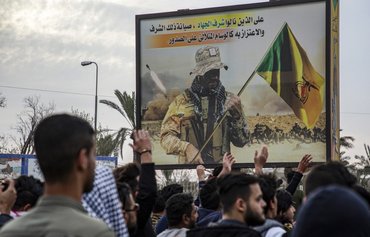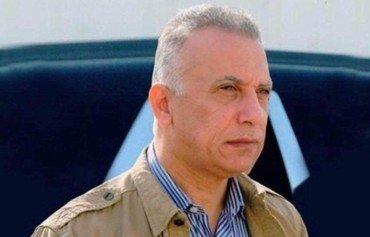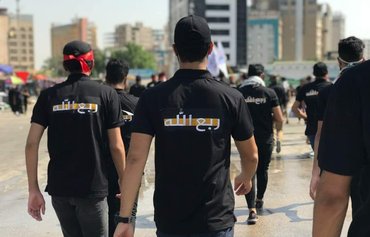Kataib Hizbullah, Iran's fiercest proxy militia operating in Iraq, must be reined in in order to roll back the influence of the Islamic Revolutionary Guard Corps (IRGC), experts told Diyaruna.
The militia, along with other pro-Iran factions, is exploiting its affiliation with the Popular Mobilisation Forces (PMF) to carry out activities that serve Iran's agenda and harm Iraq's interests, they said.
Kataib Hizbullah assumed its present form in April 2007 when five armed factions active since 2003 -- Kataib Abu al-Fadl al-Abbas, Kataib Karbala, Kataib al-Sajjad, Kataib Zeid Ibn Ali and Kataib Ali al-Akbar -- joined forces.
It has become the most conspicuous arm of the Iranian regime in Iraq and the sponsor of its ambitious projects, aimed at destabilising Iraq and the region.
Kataib Hizbullah and other Iran-backed militias, such as Harakat al-Nujaba and Asaib Ahl al-Haq, have provided ample evidence they "do not respect the Iraqi state and are disloyal to the homeland", said former Iraqi MP Mithal al-Alousi.
"Rather, they pledge their allegiance to the regime of al-Wali al-Faqih [Iran's Supreme Leader, Ali Khamenei]" and take orders from Khamenei and the IRGC, he told Diyaruna.
These militias put Iraq -- its people and economy -- at risk, as they are fighting to implement Iran's agenda, and killing and kidnapping those who openly reject their actions and condemn Iranian interference, he said.
These militias, especially Kataib Hizbullah, must not be allowed to operate under the auspices of the PMF, he said, which must be "cleansed of groups that tarnish its reputation and exploit it in order to achieve their goals and Iran's interests".
Al-Alousi pointed out that pro-Iran militias were never part of the Iraqi constitutional and democratic political system, as the country's constitution bans any loyalty other than to Iraq.
Yet groups loyal to Iran, including Asaib Ahl al-Haq led by Qais al-Khazaali and the Badr Organisation, are now part of al-Fateh Alliance, a parliamentary coalition. (Kataib Hizbullah is not part of this bloc).
The Iranian regime and its proxies "must realise that they are not welcome in Iraq", al-Alousi added, calling on the government to limit the influence of militias by asking the international community to place pressure on them.
Many of these militias already appear on terrorist watchlists, he said, noting that the US has classified Kataib Hizbullah as a terrorist organisation since 2009.
Staging attacks at Iran's behest
Kataib Hizbullah was founded by former PMF deputy head Abu Mahdi al-Muhandis, who was killed January 3rd in a US airstrike in Baghdad, alongside former IRGC Quds Force commander Maj. Gen. Qassem Soleimani.
Following the airstrike, the militia began attacking US and international coalition interests in Iraq under the banner of smaller groups that Kataib Hizbullah used as a smokescreen to deflect blame from its leadership.
Around 90 rocket attacks have targeted US interests in Iraq since January, including forces housed in Iraqi bases and its embassy in Baghdad's high-security Green Zone.
Future Iraqi Constitutional Party chairman Entifadh Qanbar told Diyaruna that Kataib Hizbullah is a key part of Iran's militia network, which the IRGC uses to manage its indirect confrontation with the US and the international community.
Its actions have turned Iraq and the region into a battlefield, he said.
"Iran is directing its proxies to stage confrontations on its behalf outside its territory," he said, noting that the militias are supplied with weapons and funds to fulfill the Iranian agenda of dragging Iraq into a state of chaos.
Qanbar pointed out that Kataib Hizbullah receives funding through its affiliation with the PMF, which is funded by the state budget. This covers salaries and associated costs such as deployment, training and food supplies.
The PMF is allocated an estimated $6 billion annually.
"Despite this, the militia does not follow the orders of the Iraqi state nor does it pledge its allegiance to Iraq," he said. On the contrary, it threatens the stability and interests of Iraqis in service of Iran's agenda.
Qanbar called for the PMF to be dissolved in order to lift the cover of legitimacy from Kataib Hizbullah and other Iran-backed militias within the organisation.
Without this step, "we cannot contain the danger and threat of these groups", he said.
Iran has supported the formation of the PMF and pushed its militias to join its ranks "to create an Iraqi version of the IRGC that becomes a paramilitary group in the Iraqi army and thus, would have the capability to dominate Iraq", he said.








